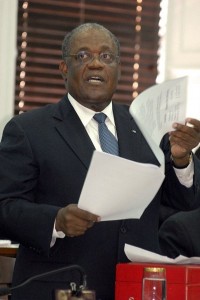
Rt. Hon. Hubert A. Ingraham/ Speaking Notes
Monday, 27th June 2011
RE: PARLIAMENTARY ELECTIONS (AMENDMENT) ACT, 2011
The amendments proposed by this Bill seek to strengthen our electoral process by expanding/increasing the number of Bahamians registered voters thereby ensuring that as many persons who are entitled to vote are able to vote in parliamentary elections held in The Bahamas.
And the amendments address concerns expressed by the Election Court in judgments made in election petitions following the 2002 and 2007 General Elections and the 2010 Elizabeth bye-election.
Most election petitions are grounded on the claim that a voter was not ordinarily resident in the constituency in which the voter registered and voted. This has often led to decisions that disenfranchised voters many or most of whom honestly believed that they were entitled to register and to vote in the constituency where they voted. In 2003, the Election Court determined that Mr. Vernon Symonette, a former Minister in the Government and Speaker of the House of Assembly and a resident of Inagua but for the time spent in Nassau following upon his appointment to the Cabinet and subsequent election to the Office of Speaker resulting in his purchasing a house in Nassau and spending time here was not entitled to be registered and hence vote in Inagua. Hence, Mr. Symonette’s and his wife votes were discarded, the Court said:
“Before we proceed further to an analysis of the evidence of each of the voters whose eligibility is challenged, we feel constrained to observe that, having regard to this history of the Election Court having to decide the issue after several general elections, Parliament which being comprised of Bahamians, and , presumably, aware of the sociology of life in this archipelago, could have provided greater assistance to the Court in specifying rules for the amorphous concept of “ordinarily resident” in the peculiar context of the Bahamas. Parliament not having done so, the Court is obliged to employ its judicial sense of each situation, which may be inconsistent with the expectation of the voters in their experience as residents of the islands. ”
Under the amendments proposed persons such as Mr. Symonette would have been entitled to vote in Inagua as the amendments give primary effect to the facts of the case and a voter’s choice as to his residence.
The amendment also provides that a person or his spouse who ordinarily lives in one island does not lose his residence because he has been transferred to work in the public service in a different island.
See 8(3) of Amendment Bill
There are two illustrations where voters would not have lost their franchise as a result of the interpretation of the term “ordinarily resident” by the Court. They can be found in the Pinewood Ruling.
“Warrick Moss registered on 2 August 2006 and listed his address as: “N/ Walnut St. E/ Thatchpalm Avenue W/Bay Geranium Ave.”. His vote was challenged by the petitioner. He testified he lived at the stated address for some 30 years and was transferred to Eleuthera by the Customs Department in November 2005. He agreed he knew from the beginning that this assignment would last for at least a year. He resided in an apartment in Eleuthera and had some clothes there, but kept clothes in Nassau as well. He said he intends to return to Pinewood at the end of his assignment in Eleuthera.
The fact that he visited Pinewood occasionally and kept some clothes in Pinewood was not deemed sufficient of a presence there to constitute ordinary residence
The Court decided that Mr. Moss ordinary residence was interrupted by his employment in Eleuthera for 2 years and his vote was disallowed.
And
Pamela Smith, a teacher registered to vote on 2 February 2006. Her address as stated is: “#2867 W/Acacia Street N/ Sea Grape Grove”.
The Director of Education gave evidence that this voter was a teacher and was transferred to Mayaguana in August 2006 and then to Abaco in January 2007 and was still assigned there.
This voter’s ordinary residence in Pinewood was interrupted for the period of nine months prior to 2 May 2007 and the Court found that she was not ordinarily resident in Pinewood and her vote was disallowed.
There is little doubt that both Moss and Smith regarded themselves as still residing in Pinewood Gardens notwithstanding that they were working in the Family Islands.
By this amendment, customs, immigration or police officers as well as teachers in the Public Service and other public officers who have lived in a constituency all their lives will not lose their residency simply because he or she has been transferred to a Family Island.
It will address the situation where a MP or Minister who lives in an island other than New Providence and resides in New Providence to discharge his ministerial and parliamentary duties. The issue is not academic. Those Ministers and MP’s spend majority of their time in New Providence but still live in their Family Island constituency and maintain residences there. It applies to Members of Parliament for both major political parties in examples of Philip Bethel and Vernon Symonette.
To make abundantly clear that the same practice ought to be the case for all other voters provision will be made to ensure that the same principle will apply to non-civil servants: Freeport residents working in Abaco; Andros residents working in New Providence; Long Island residents working in Exuma or Eleuthera residents working in San Salvador.
As to students abroad, the amendment extends it to their spouses and eliminates the need for them to be enrolled in an institution thus permitting those studying in an apprenticeship or other training program to maintain their residence at home. This corrects another example where a young person had her vote disallowed in the 2002 MICAL constituency. (Page 3)
The amendment to section 8 is patterned on the New Zealand’s electoral legislation regarding ‘residence’.
Clause 3 of the Bill amends section 9 of the Act. It extends the period in which a voter may vote in a constituency notwithstanding that he has moved out of the constituency. The present period is six months; it is now being extended to one year. The reality is that persons who have registered and later move out of the constituency do not immediately transfer after they have been in their new constituency for three months. They are focused on other things. By extending the period from 6 months to one year the result will be that the vast majority of voters who will have registered on the new register (registration of which began in late 2010) will be entitled to vote in the next election. This will be the case even if they may have moved out of the constituency and did not transfer to a new constituency.
Clause 4 of the Bill is an administrative change and provides for an Assistant Returning Officer.
Clause 5 of the Bill requires the Registrar General and the Superintendent of Prisons to provide information to the Parliamentary Commissioner on a three month basis. This will further assist the Parliamentary Commissioner in purging the Register of persons who have died and to make a note on the Register of those persons who are not eligible to vote because they are in prison.
Clauses 6, 7, 9, 10 and 18 of the Bill permit persons living abroad who are eligible to vote to register to vote at Embassies and Missions designated by the Parliamentary Commissioners. This fills a lacuna in the law as the present Parliamentary Elections does act does not permit students and persons working at The Bahamas missions and other accredited institutions to register to vote at The Bahamas missions abroad. They must come home to register to vote. (Page 6)
Clauses 12 is one of a number of amendments to replace references to Family Island “Commissioners” with references to Family Island “Administrators”. [See also clause 17]
Clause 13 fills a void which will permit the Parliamentary Commissioner to amend the Register as a result of changes in boundaries up to 14 days after the House has been dissolved and the Writ of Election has been issued. This addresses a lacuna in the law which was pointed out by the Election Court in the judgments on an election petitions after the 2010 bye election in the Elizabeth Constituency. In its judgment, the court said:
“When the [Parliamentary Commissioner] purported to remove this voter’s name off the Register on 30th January, 2010 then he could not lawfully do so. He is not competent to summarily remove persons off the register whether, or not, he has reasonable cause to believe the information on the register is wrong and they should not be on the register”
It should be pointed out that this power which is being given to the Parliamentary Commissioner is limited to the circumstance where he is moving the voter off the register for one constituency and putting the voter on the register of another constituency because the voter was put by the Parliamentary Commissioner in the wrong constituency following a revision of the Boundaries following a Boundaries Order. It gives the Parliamentary Commissioner fourteen days after the Writ of Election is issued to make such corrections as may be necessary. After fourteen days the Register is FINAL.
Clause 18 of the Bill is a major reform. For the first time it permits students and persons working in the foreign missions and their spouses to vote at polling stations in certain missions. Under the present law students and persons working at the embassies must come home to register and vote. This is expensive for them. This amendment permits them to vote at certain embassies or consulates designated by the Parliamentary Commissioner. The overseas voter, who must have been registered to vote, may apply to Parliamentary Commissioner for an overseas ballot and may only vote at the overseas polling station which is an embassy or mission. Voting at overseas station shall be on the same day as the Advanced Poll.
We envisage Miami, Atlanta, Washington D.C. and New York in the United States and London in the United Kingdom. (Pages 9,10,11.)
We are giving consideration to the appropriate places and modality for Canada, Jamaica, Barbados and Trinidad and Tobago where we have many students.
Provisions such as these can be found in legislation in Barbados, Singapore, Guyana legislation.
(SPECIAL VOTERS)
In addition to overseas voting, clause 18 of the Bill expands the number of persons who may vote at the Advanced Poll in New Providence or Grand Bahama. Presently, only the Police and Defence Force officers and election official may vote at the Advanced Poll. The categories of persons are enlarged. They are called ‘special voters’. It includes persons who are ill and cannot vote on election day, candidates and their spouses and persons who are likely to be out of The Bahamas on election day. (Pages 12/13)
Similar provisions may be found election legislation in UK, Ireland, Canada, and Bermuda.
Clause 19 of the Bill permits any person on a line at closing time to vote. The present practice is only to permit persons in the polling station itself at 6pm to vote. This permits the presiding officer to allow any person outside on a line to enter the polling station to vote.
Clause 20 requires that you vote in the polling division in which you are registered.
Clause 21 of the Bill deals with “Protest Votes”. By this amendment, a person will vote on a yellow protest ballot only if he is in possession of a voter’s card indicating that he is registered for that constituency, but his name is not on the register of voters for that constituency. All other persons will vote on a white ballot paper. In short, once a voter’s name is on the register of voters for that constituency, the voter is entitled to vote on a white ballot paper. The presiding officer may not refuse to permit a voter to vote on a white ballot paper simply because of inconsequential discrepancies but the voter is able to satisfy the presiding officer that he is the person whose name appears on the register.
Clause 22 amends the Act to make it clear that a mark on a ballot caused by the electoral ink shall not be regarded as an identification of a voter or an indication of voter intent. Members will be aware that a mark made by the electoral ink on a ballot paper has often be the basis of challenge during a count of ballots as to whether such a mark is means of identification or an indication of the voter’s intent. This amendment seeks to eliminate this debate in the future.
Clause 23 amends the law to require that the 21 days for filing election petion begin when the results are published as opposed to when the House first meets after an election. It is imperative that any uncertainty as to results of the Election be resolved quickly. This amendment simply requires persons who seek to challenge results to institute proceedings on a more timely basis. A similar provision may be found in the electoral laws of Singapore, India, Sri Lanka and Botswana.
Clause 24 provides that the Parliamentary Commissioner shall be given access to the records at the Passport Office and at Immigration Department. This addresses a concern expressed by the Election Court that persons produced fraudulent documents in order to be registered to vote. In the Pinewood election case the court observed as follows:
Kenol Seraphin holds a Bahamian passport, which is prima facie evidence of Bahamian citizenship, but Mr Lambert Campbell testified that the department of Immigration had no record of his applying for, or being granted, Bahamian citizenship on his eighteenth birthday or at anytime thereafter and could not explain the basis for the grant of a Bahamian passport to him.
In the circumstances, we find the petitioner has proven on the balance of probabilities that Kenol Seraphin is not a Bahamian citizen and there is no evidence led to refute it.
The judgment of the Election Court suggests that the Parliamentary Commissioner should at times go beyond accepting the fact of the Bahamian passport as sufficient to establish that a person is entitled to be registered. By giving the Parliamentary Commissioner access to these records the Bill seeks to address that concern raised by the Election Court.
Clause 25 of the Bill enables the Parliamentary Commissioner to give notice to persons overseas by posting the same on the Government’s website.
In summary the present amendments will
· Create greater certainty as to the constituency in which a person is entitled to register and to vote.
· Increase/expand the number of persons – e.g. students and embassy staff.
· Introduce special voters for persons entitled to vote but who may be unable to do so on Election Day.
· Reduce the number of uncounted ballots by eliminating two of the conditions resulting in Protest Votes which may only be added to the count by an Election Court.
· Limit the period within which an election petition may be presented to 21 days following upon the declaration of the result as opposed to when Parliament meets.
· Consideration is being given to only requiring a recount by a Returning Officer ofballots, if and only if, when added to votes cast, rejected, spoilt, protest and challenged, the votes could alter the outcome of an election.
· Further we are hopeful that the Register in preparation will be the last time when persons who maintain their residential address would have to re-register. This means the elimination of the 5 year Register.
The changes to the Forms are all consequential.








WHY NOW iNGRAHAM, FIRE THE PARLIAMENTARY COMMISSIONER first then table your BULLSHIT. I hope the sweeping changes sweep your *** NOT ONLY OUT OF POWER, BUT also out of parliament and out of the lives of the Bahamian people forever.
Comments are closed.